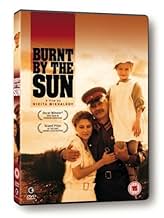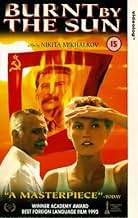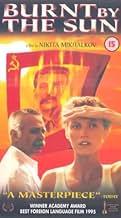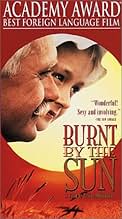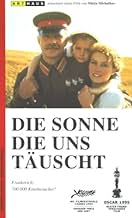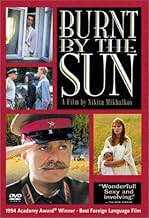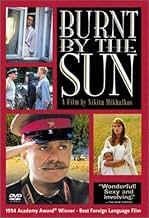AVALIAÇÃO DA IMDb
7,8/10
17 mil
SUA AVALIAÇÃO
Na União Soviética, em 1936, a repressão de Stalin repousa sobre um herói da revolução. As acusações de ser ele um espião estrangeiro são um disparate, e todos sabiam disso, mas um processo ... Ler tudoNa União Soviética, em 1936, a repressão de Stalin repousa sobre um herói da revolução. As acusações de ser ele um espião estrangeiro são um disparate, e todos sabiam disso, mas um processo lento da queda de sua vida já está em andamento.Na União Soviética, em 1936, a repressão de Stalin repousa sobre um herói da revolução. As acusações de ser ele um espião estrangeiro são um disparate, e todos sabiam disso, mas um processo lento da queda de sua vida já está em andamento.
- Direção
- Roteiristas
- Artistas
- Ganhou 1 Oscar
- 4 vitórias e 9 indicações no total
Ingeborga Dapkunaite
- Marusya
- (as Ingeborga Dapkunayte)
Nadezhda Mikhalkova
- Nadya
- (as Nadya Mikhalkova)
André Oumansky
- Filipp
- (as Andre Umanskiy)
Avaliações em destaque
Despite its dark subject matter, this is a very positive and heart warming movie. It shows Stalinism without the Western propaganda, through the lens of great Soviet people that made everything good even under Stalin possible. An ode of love to the great Russian and Soviet nation. Definitely recommended.
10Prozacc
Just saw this film as the closing class in my first term Russian language class. It's one of the ten best films I've ever seen. Our professor grew up in the Soviet Union and at the end (no spoilers, I promise) she had to leave because it was too familiar. I wasn't informed until afterwards that it was based on a true story, but it didn't matter. As I watched it I actually forgot that it was subtitled, and my memory of it now is as though it was in English. My point by saying that is that it was so real, so powerfully directed and acted, that the language barrier didn't matter one bit. Stunning film.
Having read all of the negative commentaries on this film, I would first like to point out that severely criticising the period of Soviet history in which Utoml'ennye Solntsem takes place, and in that effort, condemning the people of that era such as are portrayed in this film as being entirely culpable for their actions, is all very well and good to do from hindsight, and from the safety of a soft computer chair in the modern-day West. Because of course, no one is tortured today in the West for a casual remark against the reigning despot; nor do we live under the threat that our families may be sent off to Siberia as one of the consequences of our actions, great or trivial. I myself can't say what I would have been willing to do under the circumstances that existed during the time of the Soviet purges, whom I would have betrayed just to survive, or if I would have the courage to make some kind of moral, social, or political stand, and if I think I could have? Well,if we all admit it to ourselves, we know that torture will break any man eventually... In watching this film, I think that we should keep in mind that we are not necessarily here to judge but to take the director's journey to another time and place: and yet we should still be able to remember and respect the fact that what we are seeing here is a piece of the history that lies beneath the modern day Russia. This history is a shadow that has cast its pall over the lives of every Soviet citizen since then, including Mikhalkov. The fear of the purges that swept over the Soviet Union during the 1930's and 40's is a kind of fear that will fade, but never die away entirely. So, what can be the point in overly criticising Mikhalkov or any one in the former USSR for surviving under the system as it was before glasnost, knowing what they knew of the state and the full extent of what it could do and had already done (Stalin's purges may even have claimed 20-40 million lives)? If Utoml'ennye Solntsem is Mikhalkov's attempt to exonerate his "cooperation" with the Soviet system within his own time, what has he really got to vindicate or to feel guilty about? That being said, and despite the fact that numerous films, books, and media have copiously used this subject to tell a story, it is not a subject which can be exhausted but a rich treasure of unusual human experiences. And, as some have pointed out, this film is far more than just a story of revolutionary politics or a tale of betrayal: it IS a love story, between men and women, and between men and their motherland. Moreover, I was sincerely moved by the love triangle between Marussya, Mitya, and Kotov. Utoml'ennye Solntsem is not, however, a film that will make you laugh often, and would not at all were it not for the undeniable charm of the bold little Nadya. Utoml'ennye Solntsem will make those who appreciate the tragic element within history, and in particular, this era of political turmoil, shed more than a few tears. Because the truth lingers behind this tale, the truth of a time which was a nightmare few of us can imagine... or would want to. In my opinion, the great thing about this film is that it throws us back for a while into that era and portrays what was good about it, what remains good, despite all obstacles; the film is a tale of love that survives the most extreme of human conditions. It is fascinating and compelling, brave and tender, horrifying, and real. Not for everyone, but certainly a masterpiece within its genre.
This is an interestingly broken-backed film. Set during the Stalinist era during one idyllic summer, it begins by contrasting the lives of Dmitriy (Oleg Menshikov) and Sergey (Nikita Mikhailkov) - the one a dilettante musician and pianist, the other a colonel in the Russian army and favorite of the premier. They both have a claim on Marusya (Ingeborg Dapkunaite): Srgey is married to her, and Dmitriy was a former lover of hers. It seems that the film's moral scheme is relatively straightforward: Dmitriy is talented but feckless, while Sergey seems virtually untouchable - not only does he have a great career, but he is happily married as well. However director Mikhailkov turns the tables on our expectations and thereby transforms BURNT BY THE SUN into a penetrating analysis of how dictatorships corrupt everyone around them. Concepts of 'good' and 'evil# no longer prevail: everyone simply does what it takes in order to survive. The ending is both shocking yet predictable. Visually speaking, the film contrasts the idyllic surroundings of Dmitriy's dacha with the behavior of the protagonists - it seems that no one can actively enjoy the delights of glorious summer weather, for fear of being discovered. Life at that time must have been precarious, with no one actually being sure as to what would happen to them next. BURNT BY THE SUN is slow-moving, but Mikhailkov's camera has an eye for telling detail and significant gestures. Definitely worth watching.
This movie is about the most desperate and tragic situation in the human life. This is when our life is determined by external forces. Even the most basic form of happiness - being with you family, enjoying your child - were impossible in the Russia of Stalin.
Sometimes I think about people who were borne 20 years before World War II in Germany, Poland or Russia. I wonder whether they had a feeling that the life was extremely unfair to them. The feeling that your fate was determined by the time you were borne in, and that you couldn't do anything at all to somehow change it. If Mitya, Kotov and Marusya would not die then, they would have to wait for 50 years to be able to truly understand what happened to them and who was to blame for it.
I was puzzled why Mitya picked up the phone and agreed to arrest Kotov. Why didn't he stop his suffering immediately, as he knew that he had no other option than ruining lives of the people he loved. Was it his hatred towards Kotov and the opportunity to take revenge for being expelled for 10 years? Was it the last hope that his love to Marusya would reverse her marriage?
After watched the film again & again I decided that he knew from the offset there was no way out. Mitya went to his old home because he wanted just one thing - to say farewell to his dream that the old times would ever return. The dream that made him betray his comrades in the 20th, and come back from France in the 30th.
I'm so happy that we live in freedom and that the iron curtain fell.
Sometimes I think about people who were borne 20 years before World War II in Germany, Poland or Russia. I wonder whether they had a feeling that the life was extremely unfair to them. The feeling that your fate was determined by the time you were borne in, and that you couldn't do anything at all to somehow change it. If Mitya, Kotov and Marusya would not die then, they would have to wait for 50 years to be able to truly understand what happened to them and who was to blame for it.
I was puzzled why Mitya picked up the phone and agreed to arrest Kotov. Why didn't he stop his suffering immediately, as he knew that he had no other option than ruining lives of the people he loved. Was it his hatred towards Kotov and the opportunity to take revenge for being expelled for 10 years? Was it the last hope that his love to Marusya would reverse her marriage?
After watched the film again & again I decided that he knew from the offset there was no way out. Mitya went to his old home because he wanted just one thing - to say farewell to his dream that the old times would ever return. The dream that made him betray his comrades in the 20th, and come back from France in the 30th.
I'm so happy that we live in freedom and that the iron curtain fell.
Você sabia?
- CuriosidadesOne of four Russian films ever to win Academy Award for Best Foreign Language Film. The others are Guerra e Paz (1965), Dersu Uzala (1975) and Moscou Não Acredita em Lágrimas (1980)
- ConexõesFeatured in Namedni 1961-2003: Nasha Era: Namedni 1995 (1999)
- Trilhas sonorasUtomlennoe solntse
Written by Jerzy Petersburski (as Ezhi Petersburgskiy)
Lyrics by Iosif Alvek (uncredited)
Performed by Mark Simkin (singer), Efim Vyshkin (violin), Aleksandr Bashkatov (bayan), and Viktor Agapov (guitar)
Played by an instrumental quartet during opening credits as a film's theme song
Principais escolhas
Faça login para avaliar e ver a lista de recomendações personalizadas
- How long is Burnt by the Sun?Fornecido pela Alexa
Detalhes
- Data de lançamento
- Países de origem
- Central de atendimento oficial
- Idiomas
- Também conhecido como
- Burnt by the Sun
- Locações de filme
- Empresas de produção
- Consulte mais créditos da empresa na IMDbPro
Bilheteria
- Orçamento
- US$ 2.800.000 (estimativa)
- Faturamento bruto nos EUA e Canadá
- US$ 2.302.338
- Fim de semana de estreia nos EUA e Canadá
- US$ 60.074
- 23 de abr. de 1995
- Faturamento bruto mundial
- US$ 2.313.461
- Tempo de duração
- 2 h 15 min(135 min)
- Cor
- Mixagem de som
- Proporção
- 1.66 : 1
Contribua para esta página
Sugerir uma alteração ou adicionar conteúdo ausente



